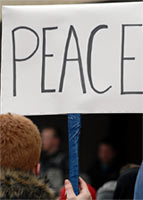New UNESCO initiative links traditional and electronic media to promote mutual understanding and peace
18-01-2007 (Paris)

UNESCO and the government of Indonesia will bring together media organizations, NGOs and governmental representatives in Bali (Indonesia), from January 21 to 23, to lay the ground for a network to promote dialogue and mutual understanding by linking traditional and electronic media.
The new Network aims to provide training in content production as well as enabling traditional media companies, including radio and television, to tap into the wealth of such productions. It is UNESCO’s conviction that enabling all groups to produce audiovisual programmes that express their cultural values and ways of life and sharing this material will contribute to international peace and security by promoting better understanding and reducing negative stereotyping.
More than 200 experts attending next week’s Power of Peace Forum will examine the concept for the Network and determine how it should be established. The opening session (10 to 11.30 a.m. on 21 January) will feature keynote addresses by Queen Rania of Jordan and the President of the Republic of Indonesia, Susilo Bambang Yudhoyono. Other speakers at this session will include UNESCO’s Assistant Director-General for Communication and Information, Abdul Waheed Khan; and Sofyan Djalil, Indonesia’s Minister for Communication and Information.
Over the following two and a half days, separate sessions will address the following issues: New Thinking on the Peace Process: Research and Practice on Cultural Dialogue, Conflict Resolution and Sustainable Development.
Still on the 21st of January, at 1.15 p.m., a session will be devoted to Best Practices: Peace-building in Indonesia (the role of media and ICTs). It will be followed, at 2.30 p.m., by a session on The Meaning and Significance of Cultural Dialgoue for Peace in a Time of Terrorism and War. At 4.45 p.m., a televised panel interview will examine the role of religion in conflict and peace
On 22nd January (8.40 a.m.), a keynote address by Indian actress and member of parliament Shabana Azmi will look into the role cinema has and can play for mutual understanding. At 9.15 a.m., a television panel discussion will ask, The Mass media and Information Communication Technologies: Part of the Problem or the Solution?
The Understanding World Network will be examined on 22nd January (10.45) after an introduction by UNESCO’s Assistant Director-General for Communication and Information. Participants will determine how it should be implemented and appoint a steering committee of stakeholders, professionals and experts in media, information and communication technologies (ICT) and peace experts. The committee will be in charge of developing the Network which should become operational within three years.
More than 200 experts attending next week’s Power of Peace Forum will examine the concept for the Network and determine how it should be established. The opening session (10 to 11.30 a.m. on 21 January) will feature keynote addresses by Queen Rania of Jordan and the President of the Republic of Indonesia, Susilo Bambang Yudhoyono. Other speakers at this session will include UNESCO’s Assistant Director-General for Communication and Information, Abdul Waheed Khan; and Sofyan Djalil, Indonesia’s Minister for Communication and Information.
Over the following two and a half days, separate sessions will address the following issues: New Thinking on the Peace Process: Research and Practice on Cultural Dialogue, Conflict Resolution and Sustainable Development.
Still on the 21st of January, at 1.15 p.m., a session will be devoted to Best Practices: Peace-building in Indonesia (the role of media and ICTs). It will be followed, at 2.30 p.m., by a session on The Meaning and Significance of Cultural Dialgoue for Peace in a Time of Terrorism and War. At 4.45 p.m., a televised panel interview will examine the role of religion in conflict and peace
On 22nd January (8.40 a.m.), a keynote address by Indian actress and member of parliament Shabana Azmi will look into the role cinema has and can play for mutual understanding. At 9.15 a.m., a television panel discussion will ask, The Mass media and Information Communication Technologies: Part of the Problem or the Solution?
The Understanding World Network will be examined on 22nd January (10.45) after an introduction by UNESCO’s Assistant Director-General for Communication and Information. Participants will determine how it should be implemented and appoint a steering committee of stakeholders, professionals and experts in media, information and communication technologies (ICT) and peace experts. The committee will be in charge of developing the Network which should become operational within three years.
Related themes/countries
· Indonesia
Share this story:
Contact information
- UNESCO Media Advisory No.2007-05
Source














